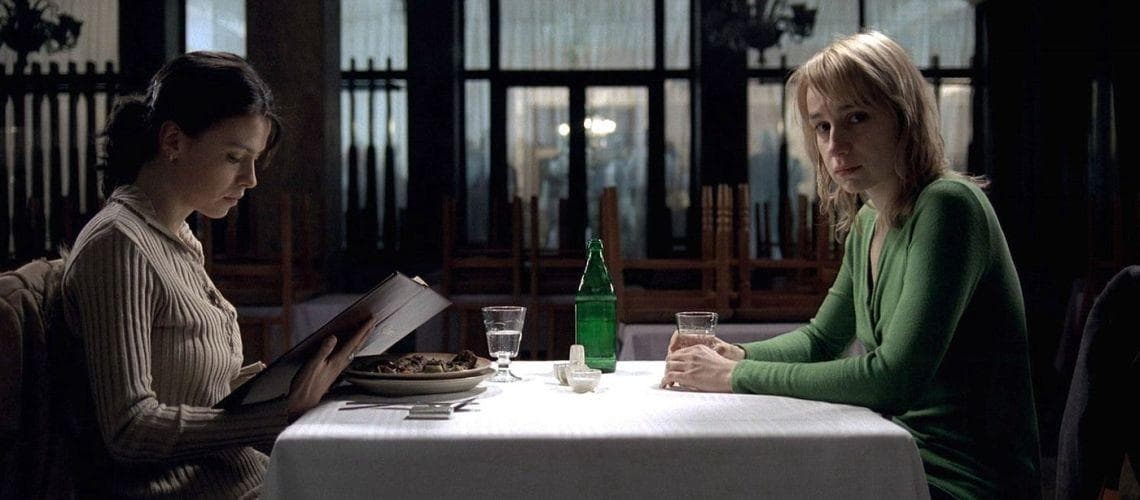
Create your own
Clone and customize this collection
Track items
Flag items with your personal status
Explore other collections; you might find something you like.
Sort by
Romania, 1987, the brutal Ceausescu communist regime is in place; birth control is illegal and abortion is a crime punishable by death. Gabita (Laura Vasliu) is almost five months into an unwanted pregnancy and in meek desperation turns to her friend and roommate, Otilia (Anamaria Marinca) for help in organizing an illegal termination. Unfortunate circumstances force the two women to use an unwanted male abortionist, Bebe (Vlad Ivanov). The bleakness of the storyline expresses a dark socio-political critique in the twilight years of a repressive dictatorship.
"Tell me how you loved me, so I understand how to love." Together, a filmmaker and her characters venture into a personal research project about intimacy. On the fluid border between reality and fiction, Touch Me Not follows the emotional journeys of Laura, Tómas and Christian, offering a deeply empathetic insight into their lives. Craving for intimacy yet also deeply afraid of it, they work to overcome old patterns, defense mechanisms and taboos, to cut the cord and finally be free. Touch Me Not looks at how we can find intimacy in the most unexpected ways, at how to love another without losing ourselves.
Seeing a way to reassert control over her adult son's life when he faces manslaughter charges, an affluent Romanian woman sets out on a campaign of emotional and social manipulation to keep him out of prison, navigating the waters of power, corruption and influence. Child's Pose is based on the sense of loss of parents who have to send their children away-physically and psychologically. The parent-child relationship is re-assessed through a son in his 30s that wants to escape from his mother, who in turn wants to keep her adult son by her side. The mother's character is quite familiar, but this film is unique in that the director delicately portrays how the controlling mother wants to deny that her son is destined to leave her by following the characters' emotional flows and gazing at their twisted desires. Luminita Gheorghiu turns in an extraordinary performance in playing a mother struggling to "save" her son. Heading to the conclusion, the film shows that the unhealthy mother-son relationship is not that simple when it comes to matters of humane duty.
Set in early 19th century Wallachia, when a local policeman, Costandin, is hired by Iordache, a boyar (local noble), to find Carfin, a Gypsy slave who had run away from the boyar's estate after having an affair with his wife, Sultana. Costandin sets out to find the fugitive, beginning a journey full of adventures. Gypsy slavery lasted from the 14th century up until the middle of the 19th century, a situation which is very little known and almost nonexistent in the public debate today, although its impact continues to influence Romania's social life.
Silviu, a young man who has spent years in a youth penitentiary, is granted release. Before he can leave, his mother returns to Romania to bring his little brother to Italy with her, despite Silviu's objections. He meets a young woman, Ana, who is working on a research project in the prison, and becomes interested in her. In his desperation Silviu resorts to violence, and Ana becomes his hostage.
Emi, a school teacher, finds her career and reputation under threat after a personal sex tape is leaked on the Internet. Forced to meet the parents demanding her dismissal, Emi refuses to surrender to their pressure. Radu Jude (Aferim!) delivers an incendiary mix of unconventional form, irreverent humor and scathing commentary on hypocrisy and prejudice in our societies.
Mr. Lazarescu, a 63 year old lonely man feels sick and calls the ambulance. When it arrives, the paramedic decides he should take him to the hospital but once there they decide to send him to another hospital and then yet another... As the night unfolds and they can't find a hospital for Mr. Lazarescu, his health starts to deteriorate fast.
Three days after the terrorist attack on the offices of Parisian weekly Charlie Hebdo and forty days after the death of his father, Lary, a doctor in his forties is about to spend the Saturday at a family gathering to commemorate the deceased. But the occasion does not go according to expectations. Forced to confront his fears and his past, to rethink the place he holds within the family, Lary finds himself constraint to tell his version of the truth.
Alina and Voichita have been friends since their orphanage days. And they have been lovers since they became sexually mature. But despite their oath of mutual fidelity, Alina, who could not bear poverty any more, emigrated to Germany where she became a barmaid. Now she just could not take the estrangement from Voichita and today she is back to Romania with a view to taking Voichita along with her to Germany. The only trouble is that in the meantime her girlfriend has betrayed her in falling in love with... God! Voichita indeed now lives in a convent where she plans to make vows. The priest agrees, if somewhat reluctantly, to accommodate Alina before their (hypothetical) departure. He sees all too well that not only is the young woman materialistic but hostile and troublesome as well...